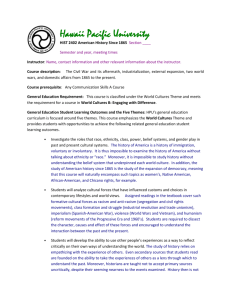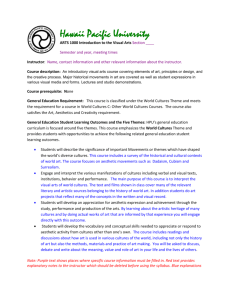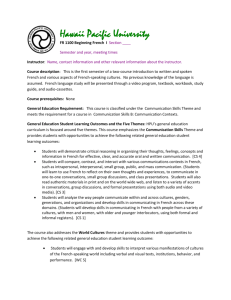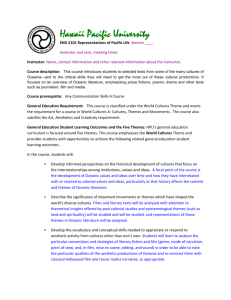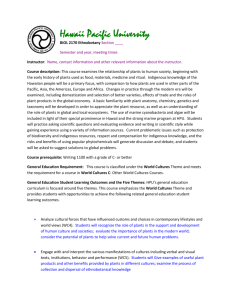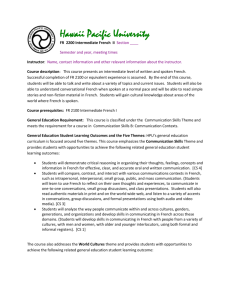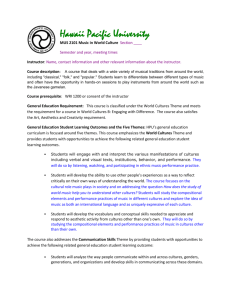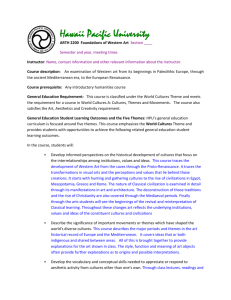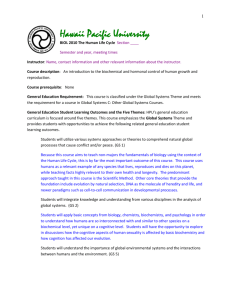Hawaii Pacific University
advertisement
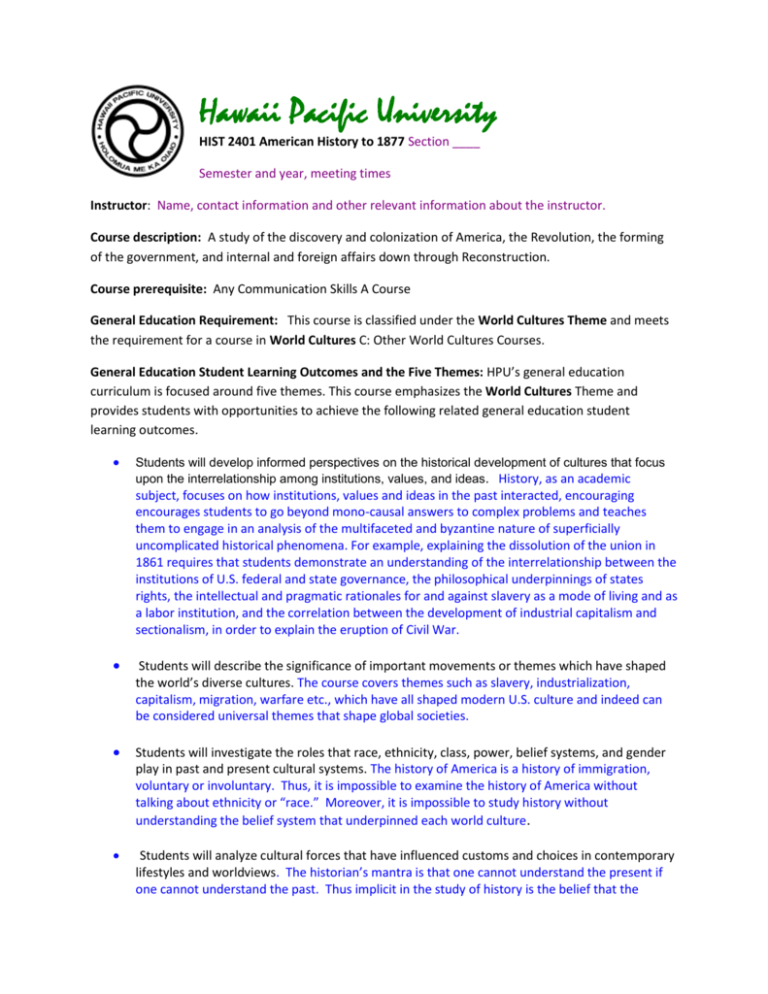
Hawaii Pacific University HIST 2401 American History to 1877 Section ____ Semester and year, meeting times Instructor: Name, contact information and other relevant information about the instructor. Course description: A study of the discovery and colonization of America, the Revolution, the forming of the government, and internal and foreign affairs down through Reconstruction. Course prerequisite: Any Communication Skills A Course General Education Requirement: This course is classified under the World Cultures Theme and meets the requirement for a course in World Cultures C: Other World Cultures Courses. General Education Student Learning Outcomes and the Five Themes: HPU’s general education curriculum is focused around five themes. This course emphasizes the World Cultures Theme and provides students with opportunities to achieve the following related general education student learning outcomes. Students will develop informed perspectives on the historical development of cultures that focus upon the interrelationship among institutions, values, and ideas . History, as an academic subject, focuses on how institutions, values and ideas in the past interacted, encouraging encourages students to go beyond mono-causal answers to complex problems and teaches them to engage in an analysis of the multifaceted and byzantine nature of superficially uncomplicated historical phenomena. For example, explaining the dissolution of the union in 1861 requires that students demonstrate an understanding of the interrelationship between the institutions of U.S. federal and state governance, the philosophical underpinnings of states rights, the intellectual and pragmatic rationales for and against slavery as a mode of living and as a labor institution, and the correlation between the development of industrial capitalism and sectionalism, in order to explain the eruption of Civil War. Students will describe the significance of important movements or themes which have shaped the world’s diverse cultures. The course covers themes such as slavery, industrialization, capitalism, migration, warfare etc., which have all shaped modern U.S. culture and indeed can be considered universal themes that shape global societies. Students will investigate the roles that race, ethnicity, class, power, belief systems, and gender play in past and present cultural systems. The history of America is a history of immigration, voluntary or involuntary. Thus, it is impossible to examine the history of America without talking about ethnicity or “race.” Moreover, it is impossible to study history without understanding the belief system that underpinned each world culture. Students will analyze cultural forces that have influenced customs and choices in contemporary lifestyles and worldviews. The historian’s mantra is that one cannot understand the present if one cannot understand the past. Thus implicit in the study of history is the belief that the revelation of the past can illuminate contemporary society. The study of American history, therefore, is implicitly the study of modern America. Note: Purple text shows places where specific course information must be filled in. Red text provides explanatory notes to the instructor which should be deleted before using the syllabus. Blue explanations above should be rephrased by the individual instructor to reflect the specific approach in that section of the course. Course specific outcomes below are an example and may also be rephrased or modified by the instructor. Course-Specific Student Learning Outcomes for HIST 2401 American History to 1877 Through the study of American history from the pre-Columbian period through Reconstruction, students will 1. gain a broad, basic factual grasp of the course of United States history and, as a result, better understand contemporary U.S. events 2) understand and demonstrate that American development did not occur in isolation, and thus comprehend the origins of the current position the U.S. occupies in the wider world. 3) understand the U.S. as part of larger world systems by studying the heterogeneous ethnic and national influences on the historical development of American political, social, economic etc., infrastructures, and thus develop an understanding of the interconnectedness of political, social, economic, religious, cultural etc., phenomena within the United States. (Supports Five Themes: World Systems) 4) develop communication skills through the writing of papers, and exams, and participation in debates and discussion. Students will develop the ability to think critically about the past and historical issues and to communicate those ideas verbally and in writing. (Supports Five Themes: Communication) 5) develop skills in gathering and analyzing evidence and in reaching informed conclusions based upon such evidence. (Supports Five Themes: Research and Epistemology) 6) advance their ability to make informed value choices by studying the diversity of political, religious, and social systems in America from the Pre-Columbian period to Reconstruction. Students will comprehend how these systems framed the moral and value choices made by both individuals and the state. Students will therefore understand the historical context within which they make their own moral and value choices today. (Supports Five Themes: Values and Choices) For the rest of these required syllabus items see the details in the faculty handbook. Delete this note once the syllabus is complete. For online courses there are some additional requirements given at this link. Texts List textbooks with ISBN’s and include this language as well All textbook information (pricing, ISBN #, and e-books) for this course can be found on the HPU Bookstore website: hpu.edu/bookstore. If you have any questions regarding textbooks, please contact the HPU Bookstore at: Phone: 808-544-9347 Or e-mail: jyokota@hpu.edu mmiyahira@hpu.edu Assignments and mode of evaluation Summary of important dates and deadlines (if the schedule is a separate document and due dates are not given with the description of the assignments). Class rules and policies (including regarding attendance, late work and academic dishonesty) Schedule of events (may be attached separately)
